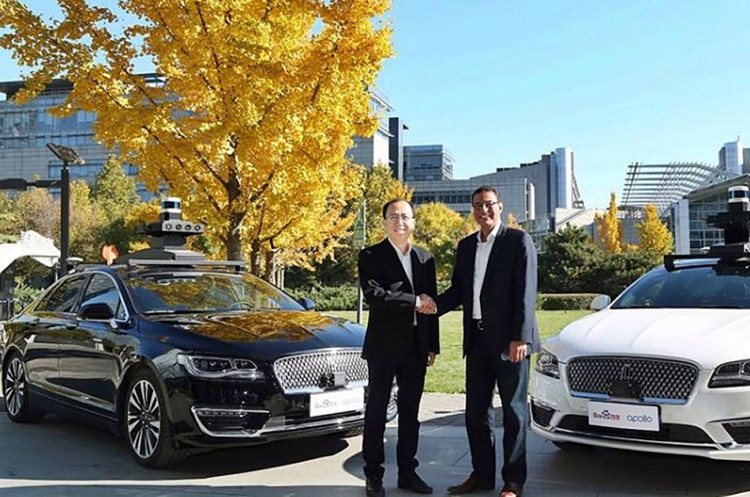The Ford Motor Company, one of America's Big Four car makers, and Baidu, Inc, China's largest internet firm, will partner to jointly test self-driving vehicles in Beijing by the end of this year.
Baidu is also China's leading developer of artificial intelligence (AI) systems that control self-driving cars. Its "Apollo" AI-driven autonomous driving system is one of the most advanced of its kind in the world. Apollo is capable of "Level 4 operations," an international standard where a driverless vehicle is smart enough to take-over driving functions under certain conditions.
Announced yesterday, the Baidu-Ford L4Autonomous Vehicle Test Project will see both giants collaborate on the development and testing of driverless vehicles that meet U.S. Level 4 standard. Ford and Baidu didn't say how much their investment in the project will come to. Neither did they release other key details.
Sherif Marakby, president and CEO of Ford Autonomous Vehicles, said working with a leading tech partner like Baidu allows Ford to exploit new opportunities to offer unique solutions that improve safety, convenience and the overall driving experience.
Marakby also said this project marks a new milestone in the partnership between Ford and Baidu and supports Ford's vision to design smart vehicles that transform how we get around.
Ford's autonomous vehicles have already been fitted with Apollo. On-road testing of Ford and Baidu's driverless vehicles should start by the end of this year.
Baidu and Ford both believe in using technology to redefine the future of mobility, said Zhenyu Li, vice president, and general manager of Baidu's intelligent driving group.
Li said this project will combine Baidu's leading-edge technological know-how and understanding of China with Ford's vehicle expertise. The project will mark a significant step forward towards Baidu's goal of developing autonomous driving vehicles that greatly benefit future consumers.
Baidu will soon launch an autonomous bus service in several Chinese cities using "Apolong," an AI-controlled and driverless mini-bus that can seat 14 people. It plans to launch the self-driving service in Beijing, Shenzhen, Pingtan, Wuhan, and a few other cities within the year.
Apolong will first service the riding public in airports, tourist destinations, and special "geo-fenced areas" where they can be better controlled. These buses are operated by Apollo.
This year is the first for the commercialization for autonomous driving. From the volume production of Apolong, Baidu can see that autonomous driving is making great strides, taking the industry from zero to one, said Chairman and CEO Robin Li.
Baidu doesn't make a physical motor vehicle. It only develops the software that runs these self-driving vehicles. Baidu's long-term goal is to launch a driverless service in Japan.
The Apolong buses are manufactured by King Long United Automotive Industry Co, Ltd, a leading bus maker based in Xiamen, Fujian. Baidu is now developing Apollo 3.0, the latest upgrade to the Apollo platform. Apollo 3.0 will allow operators to deploy masses of self-driving vehicles at the same time, instead of only one or two.






